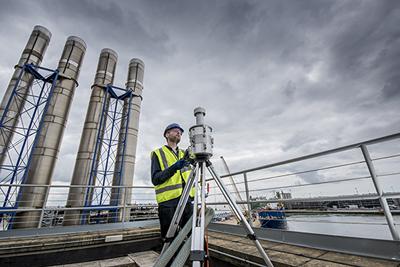Preventing disease in port cities

Researchers at Southampton have long been exploring the increasing impact of air pollution on our bodies, and now one academic is turning his attention to the docks.
Dr Matthew Loxham, BBSRC Future Leader Fellow in Respiratory Biology and Air Pollution Toxicology, is focusing his research on the health effects of pollution and particulate matter in docks and industrial areas, using Southampton’s docks as his starting point.
Through a combination of biology, chemistry, environmental science, and computer science, he is looking to discover how the docks contribute to health issues resulting from air pollution that may affect residents and workers. This research, he explains, can be used as a case study for other dock cities and ports around the world, and is an important step in understanding how we cope with the after-effects of air pollution in urban areas and other areas of industry.
He says: “When it comes to pollution, most attention focuses on cars and motor vehicles, but we don’t know very much about ships and docks. My overarching aim really is to find out more about what emissions are produced from different activities at the docks, and how that might potentially affect our health".
“Research from a number of studies shows that docks and shipping are significant contributors to pollution in their relevant cities. However, in terms of the particles released from docks and ships, they are not all the same; their effects may depend on a number of factors, including their size and chemical composition.”
While his doctoral research explored the effects of particles found in London’s underground railway stations, Matthew is now interested in how the presence of such a substantial source of pollution as the docks might have health consequences. His research will improve our knowledge of the different sources of particulate emissions in docks and from dock-related activities, and how they might differently affect our health. This will then allow dockyard emissions to be better understood in the context of other types of pollution, such as motor vehicle exhaust.
Most research carried out in this area has focused on ships, both cruise and cargo. However, the docks involve many more potential sources of pollutants. These sources can include railway, motor vehicle and metal processing activities. Matthew will be collecting particles through equipment which will be set up in the areas of these different activities. The particles collected, he hopes, will differ from site to site, and will therefore help us to understand more about how these different particles might affect our bodies after inhalation, and which sources are potentially most damaging to our health.
But with pollution and its consequences affecting the population now, Matthew’s research is also aiming to provide a more targeted approach to dealing with the issue. For example, examining the potential for small, incremental changes to lifestyle and work processes, rather than waiting for the longer-term impact of legislation and engineering solutions.
If potentially harmful particles are found, rather than dramatically changing the logistics of how the city and docks work – or shutting the industry down completely – small adaptations can be made. Examples of this include advising residents, particularly those with existing health conditions, to keep windows shut on certain days, or staying indoors if you have a health condition which can be exacerbated by high levels of pollution.
“I think it’s much more likely this will help us to understand which people might be affected; we can catch issues early or help people in some way avoid those health effects,” he says.
“There’s no quick fix. I don’t think pollution will ever be completely eradicated, but it’s about using science to understand what the effects on health are and how we can minimise those, to improve people’s quality of life in an intelligent way while reducing the potentially disruptive effect of some measures on the economy and infrastructure.”
